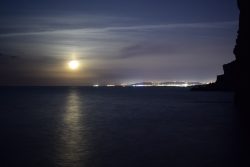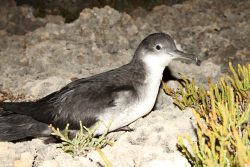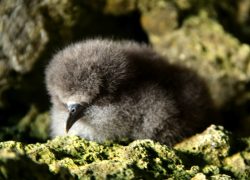Yelkouan Shearwater is a threatened seabird species endemic to the Mediterranean. Their chicks leave their nests for the open sea, under the cover of darkness, from mid-June and throughout July. However, this journey can be dangerous. Light pollution from our towns and villages causes many of these young birds to become stranded on land. BirdLife Malta’s LIFE Arċipelagu Garnija project is calling on the public to help rescue these birds. Without your help, they will never get back to the sea again.
Young Yelkouan Shearwaters are raised over two long months in dark underground burrows found in the cliffs of the Maltese Islands. They are the only chick that their parents raise that year, a reflection of the large parental investment that all shearwater species make. One night in June or July, when the chick is strong enough, it will leave its underground burrow for the sea. Taking its fledging flight into the dark night air.
Unfortunately, this flight can be cut short. Some fledglings are drawn to the artifical lights along our coastline. They fly over these lights to the point of exhaustion or collide with structures in their path. Once on the ground, they are at high risk of being killed by cats or dogs, may be hit by vehicles or succumb to dehydration and starvation. These tired, injured birds are unable to make their own way back to the sea and will die on land without your help.
BirdLife Malta asks for the public’s assistance in rescuing young Yelkouan Shearwaters left stranded by light pollution
Throughout June and July, BirdLife Malta asks that anyone in a coastal town or village to help locate and rescue stranded Yelkouan Shearwaters. Should you find one, please follow these guidelines:

- Call BirdLife Malta on 2134 7645/6 (office hours)/7925 5697 (evenings and weekends) or the police on 119 in the first instance;
- Record the location you found the bird as accurately as possible;
- Approach the bird from behind. Pick up the bird using a clean cloth or towel, controlling the head and holding the wings against the body;
- Place the bird in a well-ventilated cardboard box. Keep the box in a cool dark place;
- If possible, provide fresh water for the bird in a deep container. When the box is stationary, leave the container with water with the bird so that it can drink as needed. Do not attempt to rehydrate the bird yourself;
- Do not attempt to feed the bird.
All recovered birds will be looked at by a government vet and taken into a rehabilitation programme. Once they are back to full health they are released at safe locations or out to sea. More stranded birds are found every year thanks to the assistance of the public. Every bird that is rescued is given a second chance at life.
Read the Maltese version of the press release here.


